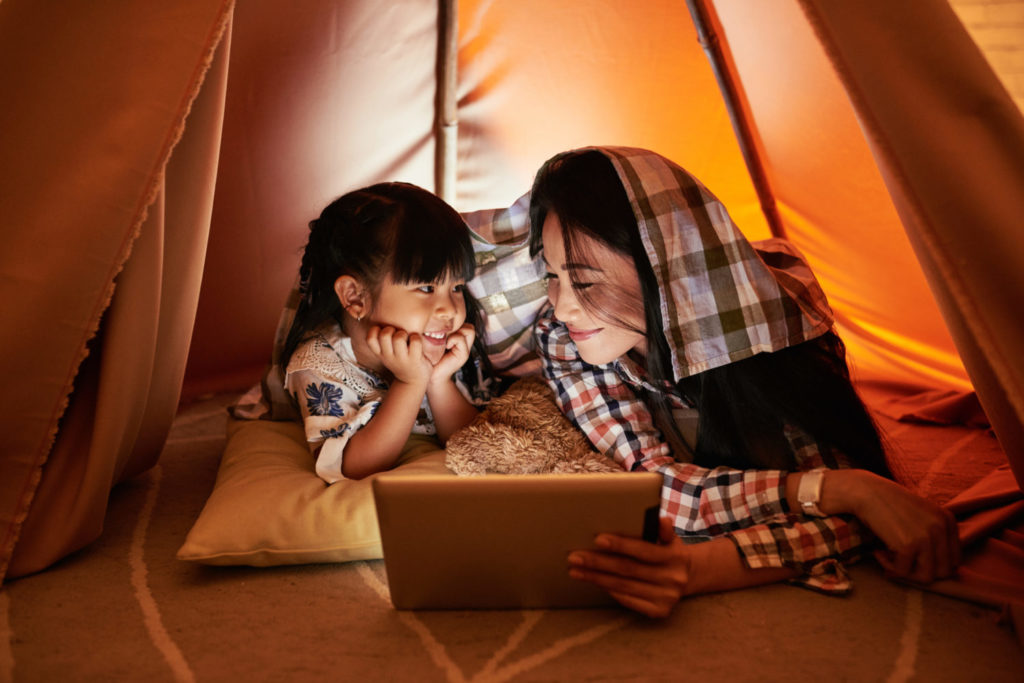Seven Ways to Make Family Movie Night Good For Everyone

Think about your favorite movie viewing experiences. Most likely, you were not alone—you were with family, friends, or possibly a theater full of engaged and interactive strangers. It probably also engaged many of your senses—cozy under a blanket, munching on something delicious, or in a cinema with a booming sound system. I bet you remember if you laughed a lot, or if the movie made you cry.
Watching a story unfold on screen taps into our autonomic nervous system (ANS), which processes many of our sensory and emotional experiences. The ANS is a hugely important system. It ties our mental and emotional wellbeing to our overall health, modulating vital functions such as our stress and calming responses, breathing, heart rate, digestion, immune response, and (crucially) social behavior.
When we have a sensory-emotional experience (whether it’s watching a movie, eating a meal with family, or getting stuck in a traffic jam), the ANS takes in sensory signals, which allow our body and brain to talk to each other about our experience, and then respond to it. Positive signals regulate our nervous system, allowing our body to enter a state of calm where the ANS runs the many functions that restore and maintain optimal health and brain function.
How can we enter this state on purpose? By helping each other get positive signals through a practice called autonomic co-regulation.
Since the ANS modulates our social behavior and social hormones, it’s actually hardwired to connect with another nervous system. When two people engage in sensory-emotional experiences together, their nervous systems can regulate each other, and both people benefit. For kids, this practice is absolutely vital, promoting better brain development, cardiac function, sleep, cognition, language, and stress resilience. But no matter how old we are, the more time we spend in this state together, the more our relationship supports our mental health, heart health, relational health, and physiological regulation.
Watching TV or a movie together can be a wonderful opportunity to co-regulate, especially for families! It’s something many of us already do on a regular basis, so why not get the most out of it that we can?
Interestingly, children under the age of five appear to be hindered more than helped by watching screens. Even all that marketing for early language learning is misleading: in a program designed to teach young children Japanese, kids who took lessons in person retained new vocabulary, whereas kids who participated in video learning retained almost nothing, despite having the same teacher. When it comes to presenting your children with valuable educational material, screens are almost never healthy at a very young age—reading, playing, and being outdoors are better ways to co-regulate during early childhood development.
But for those of us who are old enough, being intentional about how we watch together can help ensure our bodies are getting those positive signals. Here are some suggestions for making movie night a connecting and healthful experience for the whole family:
- You can begin co-regulating before the movie starts by making food or hot cocoa together, building a cozy fort, making a game out of choosing the movie, and snuggling up together in anticipation.
- Engage as many of your senses as you can:
- Sit close together or cuddle
- Share a snack
- Enjoy laughing together and don’t shy away from crying together
- If there’s a song you know, sing along together!
- Give it your full attention. No scrolling on your phone. In fact, it’s best to put it in another room, otherwise your child will be constantly anticipating an alert.
- Accompanying children while they watch helps their comprehension and your interpretations of what the two of you are seeing mitigate any negative responses to overstimulation, and scary or inappropriate content. Make sure you’re sitting in a way that they can see your face (which helps them process their own emotional experience), and be ready to pause the movie if there’s anything they want to talk about or process with you.
- If you have teenagers who retreat to the solitude of their bedroom (or phone) after dinner, creating a special movie night can be an appealing way for them to co-regulate with you. Be sure to let them choose the movie sometimes—they’ll feel respected, and your interest in their tastes will foster confidence and connection.
- When it’s over, spend some time sharing your thoughts and feelings about the story and what it meant to each of you. Look into each other’s eyes, and enjoy each other’s company.
- Whether you came together over a sad movie or a wildly funny episode of your favorite show, try to keep that connection strong as you transition to bedtime—when you (and certainly your kids) fall asleep co-regulated, the quality of sleep can improve dramatically.
Life in today’s world is so often chaotic, and as we engage more with our jobs and phones, we engage less with each other. But biologically, we were designed to nurture each other. Interpersonal care supports our health on a physical, mental, emotional, and behavioral level, from infancy through adulthood. But this doesn’t have to be overwhelming or unattainable—if we can invite each other into even the most simple daily experiences, we’ve taken an important step toward living in our optimal states of being, and helping our loved ones along the way.
